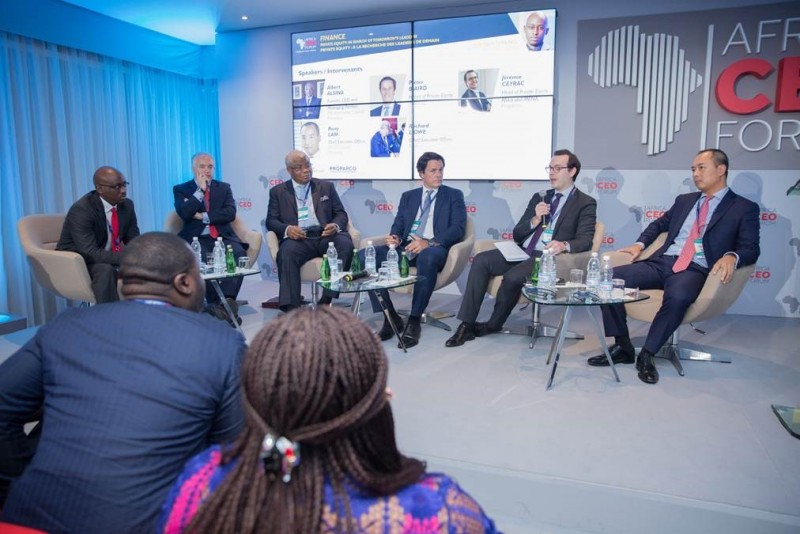For the fifth consecutive year, MCB Group was one of the main sponsors of the Africa CEO Forum, an annual event organized by Jeune Afrique that attracts over 1,000 senior African and non-African leaders who do business on the continent. This year’s edition took place in Abidjan, Ivory Coast, on 27 and 28 March.
MCB Group was represented by a six-strong delegation, including Alain Law Min and Raoul Gufflet, respectively Chief Executive Officer and Deputy Chief Executive Officer of MCB Ltd. Alain Law Min commented: “We are glad to be one of the leading sponsors of the Africa CEO Forum again this year. This conference has gained prominence as the annual rendezvous for senior executives who are active on the continent. I have very much enjoyed my interaction with government and corporate leaders from across the continent and beyond, whilst having the opportunity to showcase MCB and Mauritius.”
Rony Lam, Chief Executive Officer of MCB Capital Markets, was one of the panelists discussing “Private Equity: In search of tomorrow’s leaders”.
MCB Capital Partners, a wholly owned subsidiary of MCB Capital Markets and manager of the US$100 million MCB Equity Fund (“MCBEF”), is focused on providing capital to established and fast-growing companies in Africa. The key factor that differentiates MCBEF from other Africa focused funds is its relatively broad investment parameters, which give the team flexibility with regard to sector, geography and investment horizon. Rony Lam said: “Our strategy is to acquire minority stakes, which makes the quality of deal sourcing a particularly important factor in our investment process. We generally look to invest alongside promoters and/or co-investors who we already know or who we can suitably reference”.
The panel discussed three specific topics, among several others.
Capital chasing deals
In 2017, there were more transactions involving venture capital than growth capital, reflecting the dearth of reasonably priced acquisition targets and the difficulty of deploying growth capital, especially in an environment where owners are often reluctant to cede control. As more funds end up chasing the same transactions, vendors’ valuation expectations have increased, resulting in fewer deals being completed. This means that private equity firms are being forced to be more creative in originating and structuring deals, work their network harder and get involved at an earlier stage in the development of a target company.
There are some early signs, however, that the market may be trending towards equilibrium as funds raised by Africa focused General Partners have fallen in the past two years. Also, as baby boomers reach retirement age and often face succession issues, more businesses are coming up for sale. Meanwhile, a new generation of entrepreneurs, with a sound understanding of what private equity has to offer, is gradually taking the helm of the African corporate world. It remains, however, that more needs to be done, by governments and DFIs amongst others, to nurture the next generation of small and medium-sized enterprises that will ultimately attract private equity investment.
The infrastructure gap
Key to unlocking the potential of the continent is plugging the estimated US$50 billion annual gap in infrastructure financing and mobilizing more private investment, which has historically lagged that of DFIs. For instance, in recent years, there have been a number of new infrastructure and credit funds as private equity firms have branched out into new areas of activity, drawing upon their in-country experience and filling gaps left by major international banks.
Another source of long-term financing is local pension funds which, in the case of certain countries, run into billions of dollars. In the past, acting upon professional advice, the majority of African pension funds have invested in low-risk domestic government bonds and listed equities. A potential solution to filling the financing gap is to encourage pension fund trustees to invest in domestic infrastructure projects, which is common practice for their counterparts in the developed world. However, getting African pension funds comfortable with the idea that investing in Africa offers competitive returns and diversification benefits will require some education, which both asset managers and DFIs are able to assist with.
Despite the significant investments made in infrastructure in recent years, access rates to electricity and healthcare remain low (around 30%) while access to clean water is c.60% in Sub Saharan Africa. This means that over 400 million people still do not have clean water. “More capital needs to be deployed faster in these areas as well as in education if we are to unlock the potential of the continent.”
Africa retains investors’ confidence
Favorable demographics, rapid urbanization, an emerging middle class and increasing political stability are all factors that have underpinned the 4.6% average economic growth rate experienced in Africa between 2004 and 2014. Then came the oil price collapse that all but put a brake to foreign investment in several commodity-dependent countries such as Nigeria, leading to severe currency depreciation, interest rate hikes and economic slow-down. As Africa moves into a new era of relatively lower expected growth (the World Bank estimates that GDP growth for Sub-Saharan Africa will reach 3.2% in 2018 and 3.5% in 2019), investors remain nonetheless optimistic about the immense investment opportunities available on the continent.

